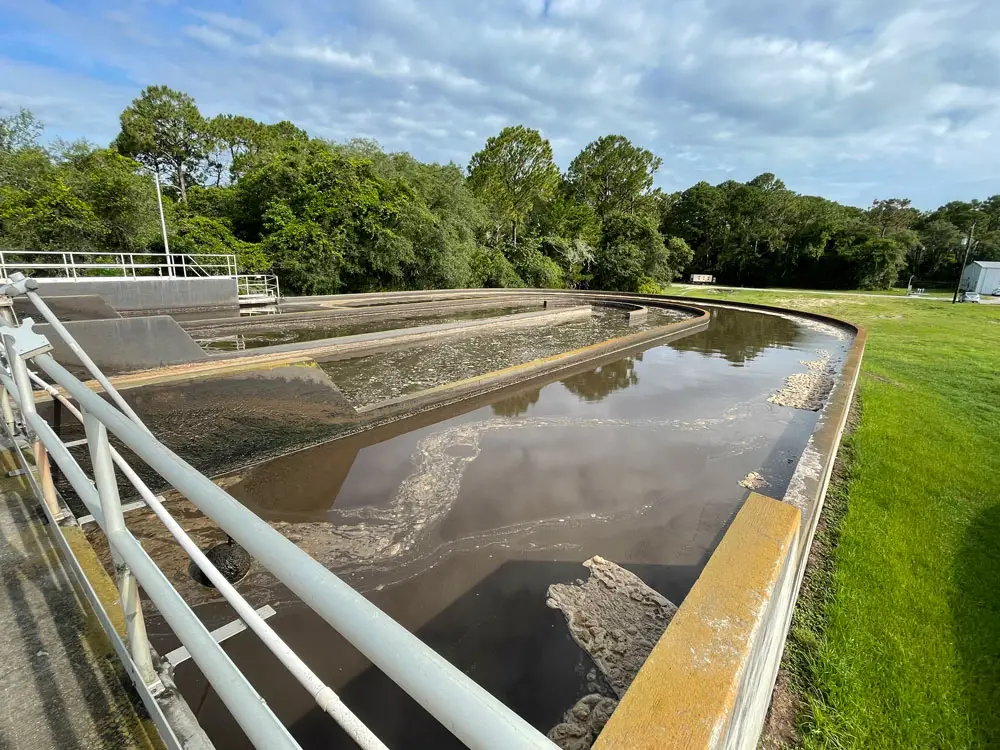
The Flagler Beach City Commission Thursday unanimously approved authorization for a loan of up to $17.6 million to rebuild and expand the city’s sewer plant, a more-than $2 million difference from when the commission was first presented figures in June, when it voted to borrow up to $15 million. In 2019, the cost of the project had been pegged at $11 million. The loan amount does not include actual, eventual costs to the city–that is, the cost of the loan with interest.
Interest costs in 2019 were projected to be three times as high. That means the current cost projection and loan terms may end up netting more favorable costs to the city and its rate-payers.
“That wastewater treatment plant has been functioning since I was in high school or before and it’s time to change it out,” City Manager William Whitson said. He was in high school in the mid-1970s.
The loan will be repaid through utility fees and sewer impact fees, the one-time levy on new construction designed to offset the impact of new development. In other words utility customers will be seeing the cost of the project in their future bills, but the city hopes the hit will be amortized by the length of the loan, and by other measures the city hopes will limit how much is actually borrowed. In 2020, the city’s utility had revenue of $5 million against operating expenses of $2.9 million, and debt payments of $550,000. According to the loan application, revenue is expected to increase to $5.5 million by 2026, while expenses are expected to increase to $3.4 million, leaving revenue available to finance the loan of $1.5 million in 2026 alone. Debt service for the loan is projected to be between $700,000 and $800,000 a year. (See the full loan application here.)
Whitson downplayed the cost to the city. “You’re dealing with probably in excess of $15 million with the interest rates. That’s the bad news,” he said. “The good news is the interest rates are likely to be below 1 percent,” with a lot of federal money that could be used by the state to subsidize loans.
The payback is a 20-year, semi-annual repayment schedule, starting six months after the project has been given a certificate of occupation. The city will only borrow what it needs as it needs it, which could also limit the amounts borrowed. The interest rate will be fixed–though it’s not fixed yet. There is a possibility that the interest rate will be lower than 1 percent.
“We were authorized for $12 million dollars for the first round. If we need an additional up to $4 million, they’ve cleared us for that,” Whitson said. “So that’s it. We’re good to go for up to $16 million and that doesn’t count anything we could get from Washington.” A Dec. 3 letter from City Attorney Drew Smith to Angela Knecht, the state revolving fund’s program administrator.
Commissioner Jane Mealy was interested in tapping into infrastructure dollars from the recently approved federal bill. That bill includes $15 billion for modernizing water systems, but the focus is on contaminated pipes and the removal of lead-lined pipes. The city’s financial consultant told commissioners Thursday there is “about a $44 billion allocation to the clean water and drinking water loan programs over the next five years. And that they’re going to try to allocate those funds, and that’s going to go out across the entire US. The cool thing about that is that I believe 49 percent of the funds at the state level must be in the form of grant or loan forgiveness. So if you can get some of that funding, that could potentially help out.”
The city has been working toward that vote for months, if not years. “We’re ready to get going. The only thing we don’t have control over is this bidding climate,” Whitson said. “Covid has created supply issues, pricing challenges. That’s why I want to keep the engineering part engaged so we can do the value engineering to bring this thing in within budget and make sure that we stretch every dollar, whether it’s a loan money or not.”
The reconstruction will extend to 25 lift stations in the city, force and gravity mains and manholes. Most if not all the plant’s infrastructure is past its useful life, with structurally damaged concrete tanks and inherent problems meeting regulatory requirements. The reconstruction are also intended to prepare the city to stop discharging effluents in the Intracoastal. The city is required by law to stop doing so in a few years.
“Hopefully we won’t get anywhere near that if we get infrastructure money,” Commissioner Rick Belhumeur said of the loan amount the commission approved Thursday. “But we’ve got to cover it to start with. We don’t have to take the whole bunch if we don’t need it.”
![]()
Click to access sewer-plant-june-2021-1.pdf





























E, ROBOT says
We’ll be facilitating all the new growth.
palmcoaster says
Have good impact fees pay what is fair to the current residents that should not be subsidizing growth by being hit with much higher fees. Look what happen to us in Palm Coast our utility bill higher than our FPL bill so far.